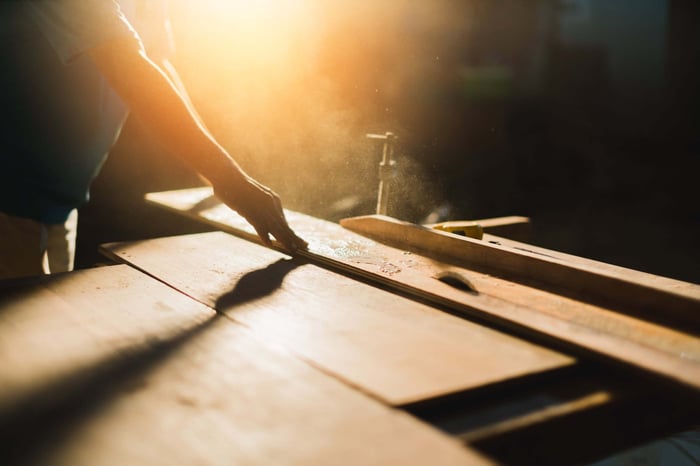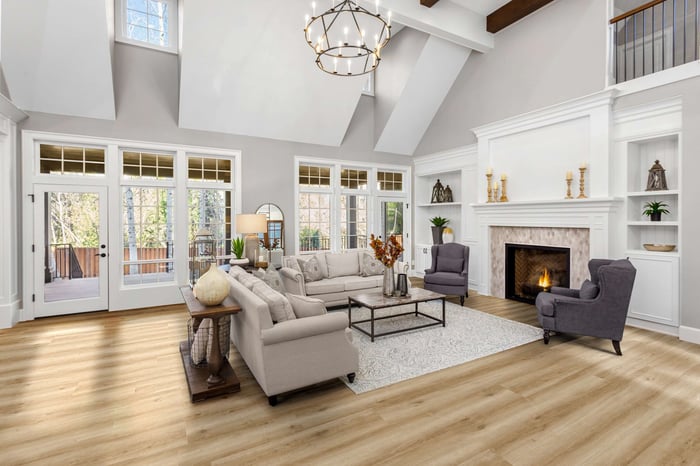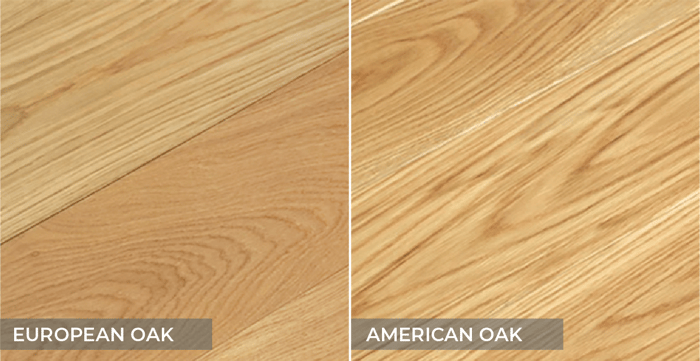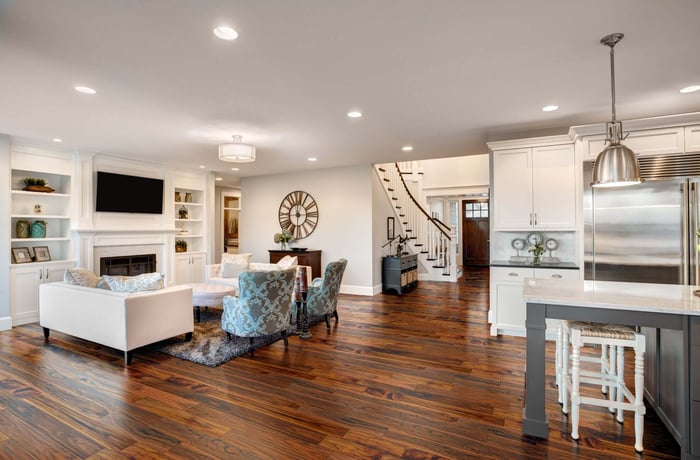Choosing the right hardwood floors can completely transform the interior of your home. Hardwood floors can make a room look far more spacious than carpeting typically can, and the array of available colors allows for seamless integration with any theme or decor style.
Once you settle on hardwood flooring, there are a number of things to consider, one being the type of hardwood finish that will be suitable for your lifestyle and daily maintenance routine. Among the different types of finishes available, each comes with its advantages and potential drawbacks. Depending on your aesthetic goals, budget, and lifestyle, some options may better suit your needs than others.
If the options for hardwood finishes seem overwhelming or confusing, we’re here to help. Read on to learn the pros and cons of several wood floor finish options. Then, visit the Harper Floors website or call 1-888-807-2704 to learn more about hardwood floors and purchase your flooring.
What Is Hardwood Finish?
While real wood is a robust material, it has several significant weaknesses before it is manufactured and finished to become hardwood floors. The main weakness of real wood is that it is naturally absorbent. Wood will absorb water that comes into contact with it, which could potentially compromise the material's structural integrity.
If wooden floorboards absorb moisture, it can be a big problem. When wood gets wet, it can swell and warp, causing the floorboards to lift and separate. Moreover, these conditions promote mold growth, which can be a nightmare for homeowners.
Fortunately, a hardwood finish addresses these concerns. A hardwood finish combined with a wood sealer renders the wood far more resistant to moisture and damage. This finish also grants hardwood floors their distinct color.
Factors to Consider
When choosing a hardwood finish, homeowners must consider a few factors. Different hardwood floor finishes provide varying levels of durability and protect against certain types of damage. Consider your specific needs before choosing your finish, especially the damage your floor may suffer.
For instance, homeowners with children may want to prioritize moisture and spill protection. However, scratches will be a more significant concern for those with pets. The finish’s environmental safety is another major factor to consider, especially if you have children or animals.
1. Polyurethane Finish
The most commonly used floor finish for modern hardwood is polyurethane. This finish is exceptionally durable and versatile, allowing for a wide range of styles and applications. By varying the application and mix of the finish, experts can create customizable glossy, satin, or matte effects.
There are two different types of polyurethane finishes, both of which have unique characteristics and are effective in most applications. However, it's essential for homeowners to understand the differences between them regarding care and maintenance.
2. Water-Based Finish
If easy application is your priority, water-based polyurethane is your best bet. This finish is exceptionally forgiving, creating few odors and drying quickly. Besides offering a hassle-free application, this finish can create an impressive look that is natural rather than artificial or fake.
While very durable, water-based polyurethane is less durable than other finishes like aluminum oxide, and thus more prone to damage. Because homeowners cannot wax these floors, it may be difficult to hide this damage. So, homeowners with a large or active household may want to find a more durable option.
3. Oil-Based Finish
Oil-based polyurethane is an excellent alternative for homeowners worried about the limited durability of water-based finishes. This type of finish is highly resilient, and business owners often choose it for commercial applications because of this advantage. The robustness of this finish can also be valuable in residential applications, with homeowners often utilizing the finish in high-traffic areas.
However, this type of finish is much more challenging to work with than water-based options. First, oil-based finishes are highly flammable with a strong aroma. They also take longer to dry, requiring homeowners to vacate their home for a longer period than with other finishes.
Lastly, while homeowners can sometimes apply water-based finishes, contractors are typically responsible for handling oil-based products.
4. Moisture-Cured Urethane Finish
If maximum durability is the goal, moisture-cured urethane is an excellent option. This finish dries to a glossy shine and creates a resilient seal against moisture. Business owners often opt to purchase flooring with this finish in high-traffic commercial settings such as bowling alleys, demonstrating its high resistance to scratching and wear.
While this finish is highly durable, installation is a challenge. Because the moisture in the air impacts the finish’s outcome, homeowners may struggle with the material’s quirks. As a result, this type of finish usually requires professional expertise at a factory.
5. Shellac Finish
Another commonly used flooring finish, shellac consists of the excretions of an insect called the lac bug. For generations, builders have used shellac as a sealer, so this material has a solid track record. While not as robust as modern options, shellac is environmentally friendly and easy to apply.
6. Aluminum Oxide Finish
A type of finish only found on pre-finished wood, aluminum oxide is the most resilient finish available. This coating is perfect for areas with a lot of foot traffic. With proper care, this finish can last for years without showing signs of wear.
This finish is also aesthetically versatile as manufacturers can apply it differently to create different gloss levels.
The main downside of this type of finish is that you usually cannot reapply it. In addition, because the factory applies the finish to each piece during production, it can be difficult to repair this flooring without replacing the floorboards themselves.
However, as long as you're careful, aluminum-oxide floors can last over twenty years. Overall, the good outweighs the bad.
7. Hard Wax Oil Finish
While still available for purchase in many places, hard wax oil is a somewhat outdated option in today's market. Although its application process is relatively simple, this type of finish requires a lot of maintenance. As a result, it remains effective for far less time than modern coatings.
Some homeowners opt for this type of finish because they can apply it themselves. However, hard wax oil’s maintenance requirements and consistent reapplication typically outweigh the upfront savings.
8. Acid-Cured Finish
Acid-cured finish is the epitome of both durability and aesthetic appeal. Acid-cured finishes also offer higher durability than any polyurethane finish on the market. Furthermore, they impart a beautiful sheen once dry.
However, this type of finish is difficult to install and repair. Homeowners will need a professional’s assistance when working with acid-cured finish. Additionally, the material contains a lot of VOCs, so homeowners will need to vacate for a few days while the finish cures.
Closing Thoughts
You should now have deeper knowledge of the various hardwood floor finishes available. Overall, you won’t find a single floor finish that’s objectively better than another. Every one of these finishes can effectively address specific needs and concerns.
For tips on how to find a flooring installer, visit the Harper Floors website for a wealth of information.
If you still aren't sure what type of finish works best for your flooring, the experts at Harper Floors are happy to help. Our team has years of experience providing high-quality floors and can answer any questions you have.
If you're ready to take the first step towards beautiful new floors, call Harper Floors at 1-888-807-2704 today.









